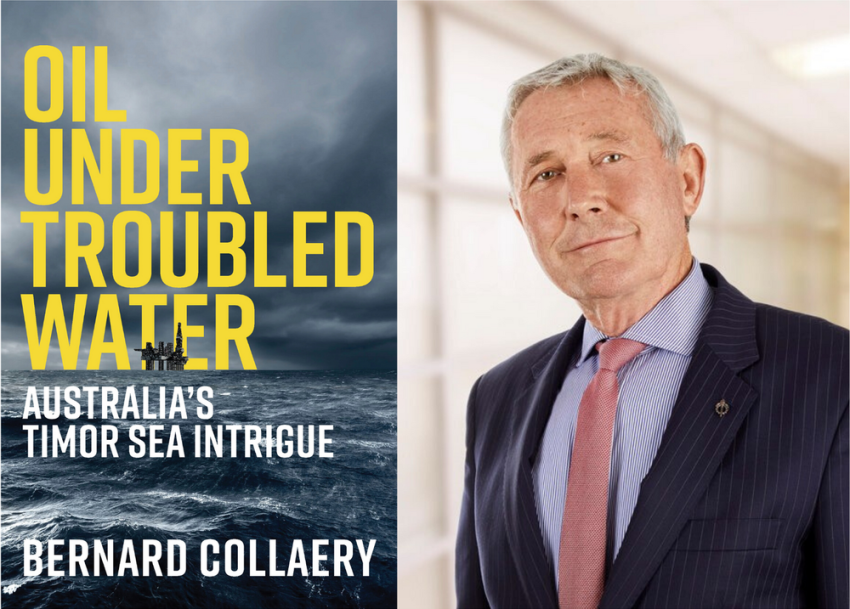
Oil Under Troubled Water, Australia’s Timor Sea Intrigue
By Bernard Collaery
Melbourne University Press, 2020, 466 pp., $39.99
Bernard Collaery is well known as a legal champion of Timor-Leste, and a thorn in the side of successive Australian governments as they have illegally and immorally stolen that country's resources.
He has been a friend and advisor to independence leader Xanana Gusmao, legal counsel to Witness K, the spy who blew the whistle on Australia’s bugging of the East Timorese cabinet rooms and he is currently defending himself in a closed trial against charges of improperly receiving Australian secret documents.
This book reads like a testament to be read should he go to jail.
It is an exacting dissection of Australia’s history of involvement in East Timor, going back to the early years of the 20th century. Collaery appears to have read every archived government document on East Timor and he lays out his material at length.
What he demonstrates is that Australia has always perceived East Timor as a passive object of imperial gaze. Whether it was in seeing it as a part of our “northern defence arc” or as a milch cow to be robbed of its petrochemical resources, for both Labor and Coalition regimes it has been fruit ripe for the taking.
While East Timor was a Portuguese colony, Australia had a long-standing policy of gaining control of the Timor Sea by stealth. Australia illegally issued oil exploration permits that encroached into Portuguese waters.
As Collaery demonstrates there was a working relationship with the Indonesian Suharto dictatorship whereby the leftist Fretilin post-colonial government was overthrown and a cosy, illegal treaty was agreed for sharing out the oil beneath the waves of the Timor Sea.
Collaery argues that it was actually helium contained in the reserves that Australia was chasing, more than the oil and natural gas. Helium is a strategic material, worth a fortune and Australian ministers deliberately withheld information about its presence while negotiating with the post-independence Timorese leadership.
That the helium enriched the corporations involved rather than becoming a strategic stock for Australia is ironic, to say the least. Collaery skirts the defamation laws adroitly on that point.
Ex-Victorian premier Steve Bracks is quoted on the book’s front cover as saying it is “essential, if difficult reading for all Australians.”
Those words are very true. It is essential for Australians to realise the extent of our rulers’ immorality, dishonesty and collusion with oil corporations. If they are prepared to ruin the lives of the East Timorese so callously, what might they be prepared to do to Australians?
However, Bracks’ use of the word “difficult” is double-edged. The book is difficult because it is a shameful tale. However, it is also virtually unreadable in large sections.
Collaery is a life-long lawyer who served with distinction as Deputy Chief Minister and Attorney-General in the ACT government. His failing as a writer is that he is fascinated by the law rather than the narrative. This book will be a compulsory text in future international law courses and a negative example in plain-English writing courses.
Collaery also demonstrates some remarkable, if not eccentric individual and political prejudices.
He is a friend of and operated as a confidant to Xanana Gusmao, who for years has been in political conflict with Fretilin leader, Mari Alkatiri. For Collaery, the sun shines out of Gusmao and Alkatiri can do no good.
Collaery ascribes every error in East Timor’s negotiations with Australia to Alkatiri while extolling Gusmao. That argument is simply untenable.
In the immediate post-independence negotiations, Alkatiri was advised and supported by the Untied Nations and some of the best international petrochemical experts. None of them recognised the Australian government subterfuge.
Alkatiri was desperate to get some government funds to rebuild war-ravaged Timor-Leste while confronted by a devious opponent. That East Timor was robbed was not his fault.
Similarly, Collaery muses that a better post-independence arrangement would have been a Gusmao regime installed undemocratically by the UN, modelled along the lines of Charles de Gaulle’s post-WWII, paternalistic French government. He disparages the fact that Fretilin won an overwhelming mandate in the first elections.
His admiration for Gaullism is unfortunate and he should be careful about what he wishes for. The high-handed repressive treatment he is experiencing right now from the Australian government is similar to what de Gaulle dished out.
Despite its shortcomings this story must be broadcast around the world. Another historian, one who knows how to communicate clearly, will find it an excellent source and use it to skewer the Australian ruling class.